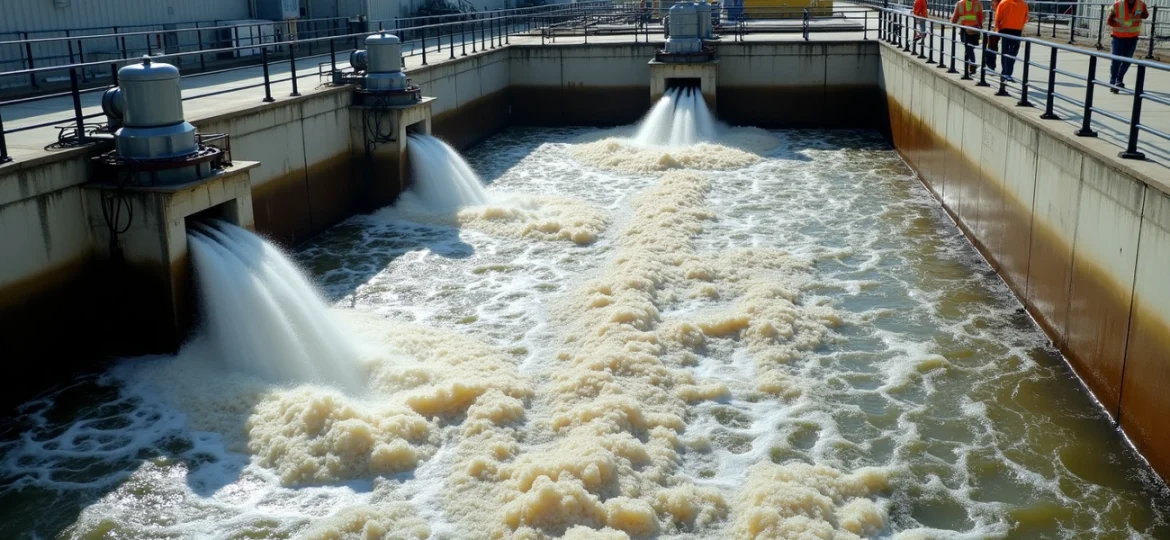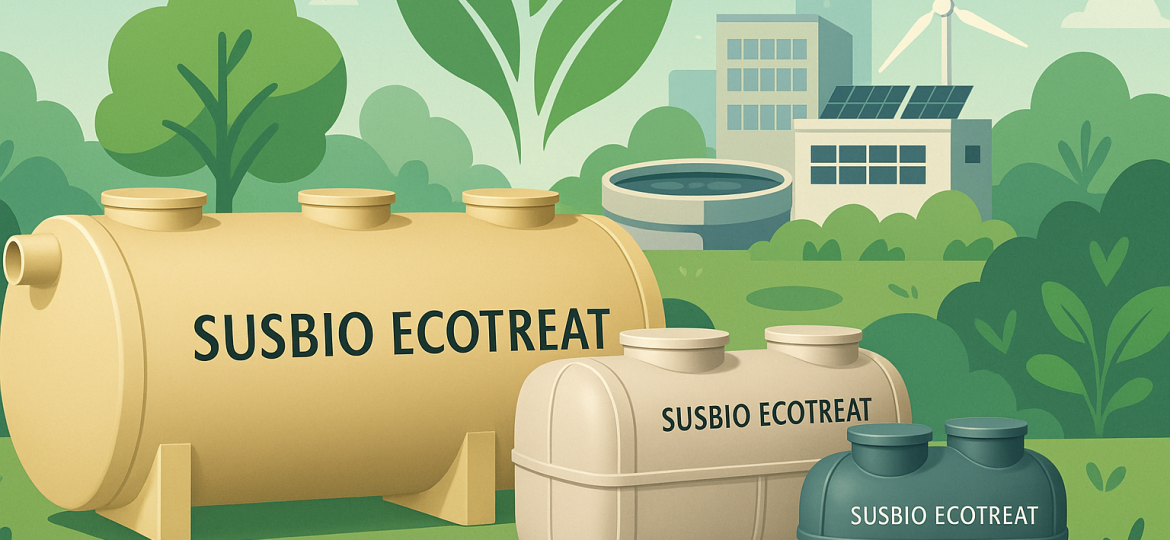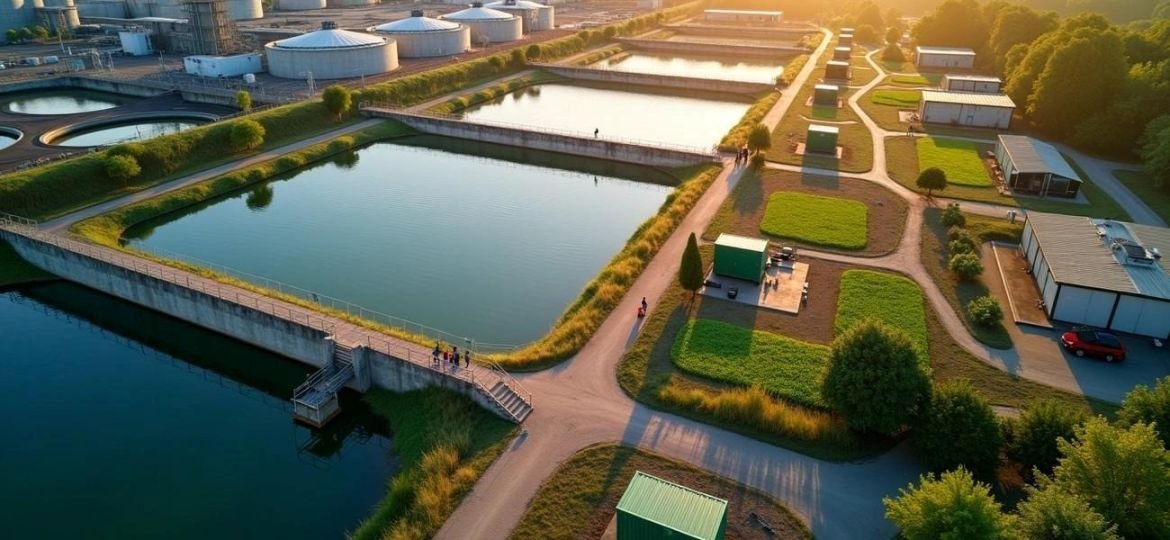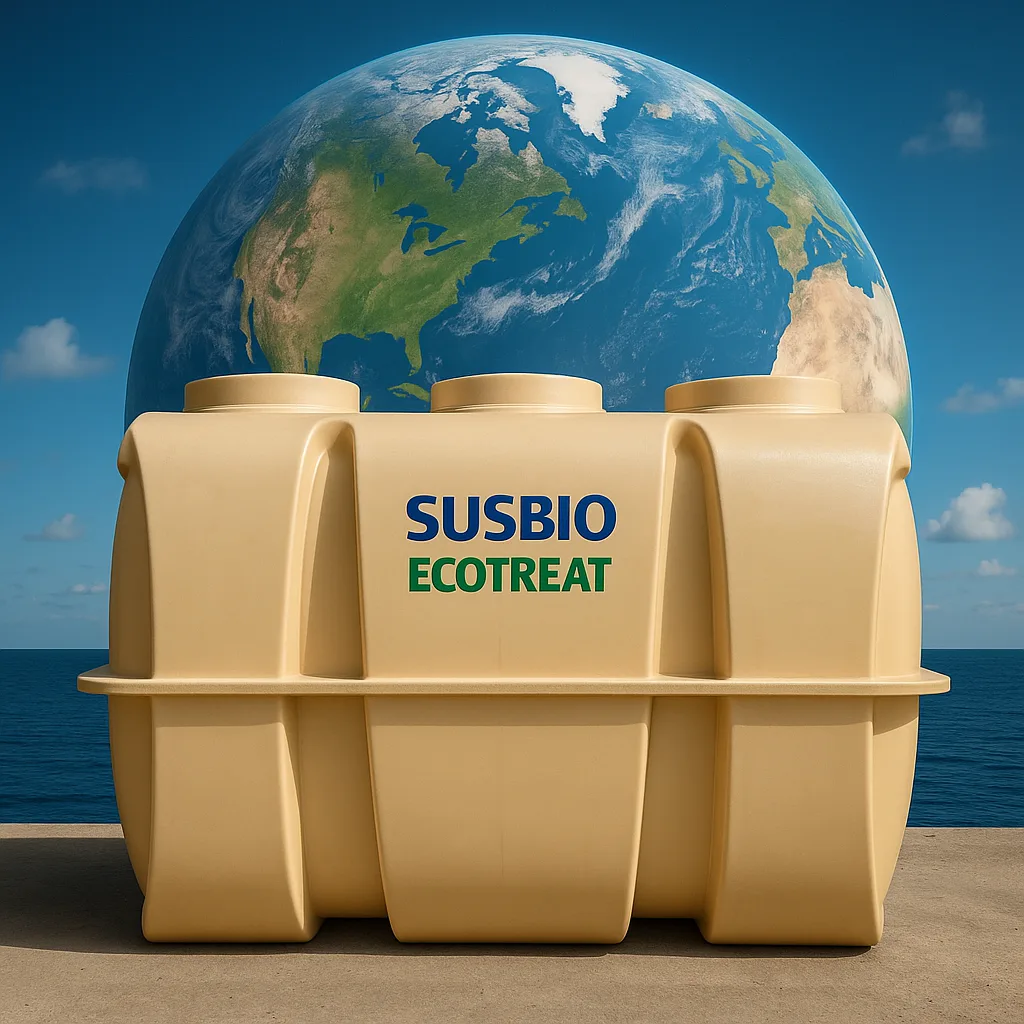Effective domestic waste water treatment is essential for protecting both public health and the environment. For homeowners, particularly those in areas without access to municipal sewage systems, understanding the options for treating household wastewater is crucial. This comprehensive guide explores domestic wastewater treatment solutions, from traditional septic systems to advanced technologies like SUSBIO ECOTREAT that are transforming residential water management.
Understanding Domestic Wastewater
Domestic wastewater, also called sewage or household wastewater, includes all water discharged from residential properties. This encompasses:
- Blackwater: Water from toilets containing fecal matter and urine
- Greywater: Wastewater from sinks, showers, washing machines, and dishwashers
- Storm water: Rainwater that may enter the domestic wastewater stream
On average, each person generates approximately 100-150 liters of wastewater daily through normal household activities. This wastewater contains various contaminants, including:
- Organic matter (food waste, human waste)
- Nutrients (nitrogen and phosphorus)
- Pathogens (bacteria, viruses, parasites)
- Household chemicals (detergents, cleaners)
- Personal care products and pharmaceuticals
Without proper treatment, these contaminants can contaminate groundwater, pollute surface water bodies, create public health hazards, and damage ecosystems.
Common Challenges in Domestic Waste Water Treatment
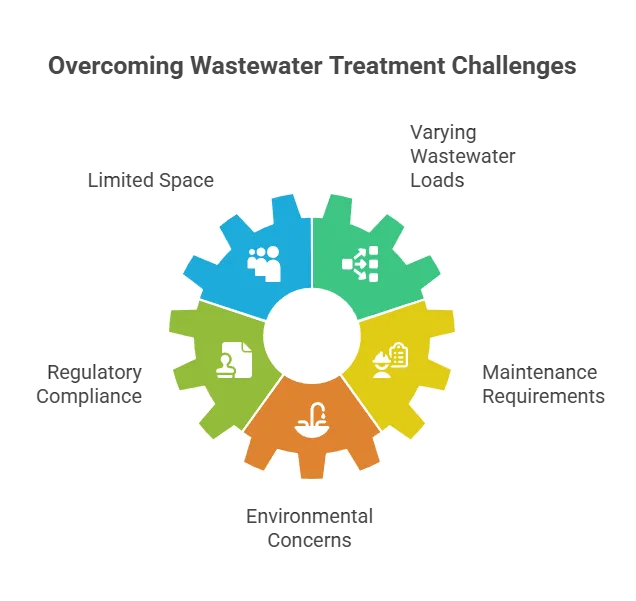
Homeowners face several challenges when managing residential wastewater:
Limited Space
Many residential properties have limited space for wastewater treatment systems, particularly in urban and suburban areas. Traditional systems like septic tanks and drain fields require significant land area, which may not be available on smaller lots.
Varying Wastewater Loads
Household wastewater generation fluctuates throughout the day and week, with peak flows typically occurring in the morning and evening. Treatment systems must accommodate these variations while maintaining consistent performance.
Regulatory Compliance
Local regulations govern domestic wastewater treatment, with requirements varying by location. Homeowners must navigate these regulations when installing or upgrading systems, often requiring permits and inspections.
Maintenance Requirements
All wastewater treatment systems require regular maintenance to function properly. Homeowners must understand and fulfill these requirements to ensure system longevity and performance.
Environmental Concerns
Improperly treated domestic wastewater can contaminate groundwater and surface water, potentially affecting drinking water sources and aquatic ecosystems. Modern treatment approaches must address these environmental concerns.
Effective Waste Water Treatment Methods for Residential Use
Homeowners can choose from various wastewater treatment methods based on their specific needs and property constraints. Each method offers distinct advantages and limitations:
Conventional Septic Systems
The traditional approach to domestic wastewater treatment includes:
Septic Tank: A watertight chamber where solids settle and begin to decompose
Drain Field: A network of perforated pipes in gravel-filled trenches where partially treated wastewater infiltrates the soil
Advantages:
Relatively simple and passive operation
Lower initial cost compared to advanced systems
Familiar to contractors and regulators
Limitations:
Requires significant land area
Limited treatment capability
Potential for groundwater contamination if improperly maintained
Not suitable for all soil types or high groundwater areas
Advanced Treatment Systems
For properties with challenging site conditions or stricter treatment requirements:
Aerobic Treatment Units (ATUs): Incorporate oxygen to enhance biological treatment
Media Filters: Use sand, peat, or synthetic materials to filter wastewater
Constructed Wetlands: Utilize plants and natural processes for treatment
Membrane Bioreactors: Combine biological treatment with membrane filtration
Advantages:
Higher treatment levels
Smaller footprint requirements
Better performance in challenging soil conditions
Reduced environmental impact
Limitations:
Higher initial cost
More complex operation and maintenance
May require electricity
Often need professional service contracts
Package Treatment Plants
Compact, pre-engineered systems like Susbio Ecotreat offer comprehensive treatment in a single unit:
Advantages:
Complete treatment solution in a small footprint
Factory-built quality control
Rapid installation
Consistent performance
Often fully automated
Limitations:
Higher initial investment
May require professional maintenance
Typically need electricity for operation

Understanding the Waste Water Treatment Process for Homes
The waste water treatment process for homes is typically simpler than industrial applications but follows similar principles. Understanding this process helps homeowners appreciate how their systems work and the importance of proper maintenance.
Primary Treatment
The first stage focuses on physical separation:
- Solids Separation: Wastewater enters a settlement chamber where heavier solids sink to the bottom forming sludge, while lighter materials like oils and grease float to the top as scum.
- Anaerobic Digestion: In septic tanks and some package plants, bacteria begin breaking down organic matter in an oxygen-free environment.
- Effluent Clarification: Clarified liquid moves to the next treatment stage, while solids remain for further decomposition.
Secondary Treatment
This stage focuses on biological treatment:
- Aerobic Digestion: In systems with aeration, oxygen-loving bacteria rapidly consume organic matter.
- Biofilm Development: In media-based systems, beneficial bacteria form films on surfaces where they process contaminants.
- Nutrient Reduction: Some advanced systems include processes specifically designed to reduce nitrogen and phosphorus.
Final Treatment and Disposal
The final stage prepares treated water for release:
- Disinfection: Some systems include UV light, chlorination, or other methods to reduce pathogens.
- Filtration: Advanced filtration may remove remaining fine particles.
- Dispersal: Treated effluent is dispersed through drain fields, irrigation systems, or direct discharge (where permitted).
Selecting the Right Home Waste Water Treatment Systems
Choosing the appropriate system for your home requires careful consideration of several factors:
Site Assessment
- Soil Conditions: Soil type, percolation rate, and depth to restrictive layers
- Lot Size: Available area for system installation
- Topography: Slope and drainage patterns
- Groundwater: Depth to seasonal high water table
- Proximity to Water Bodies: Distance to wells, streams, lakes, and wetlands
Household Characteristics
- Number of Occupants: Current and anticipated future residents
- Water Usage Patterns: Daily water consumption and usage habits
- Special Considerations: Home businesses, frequent
SUSBIO and SUSBIO ECOTREAT: Transforming Residential Wastewater Management
As domestic wastewater challenges become more complex, solutions must evolve to deliver better performance with lower environmental impact. SUSBIO, a forward-thinking company in environmental technology, addresses these challenges through its innovative, eco-friendly wastewater treatment systems.
About SUSBIO
SUSBIO specializes in decentralized wastewater treatment solutions tailored for residential, commercial, and small community applications. With a focus on sustainability, automation, and minimal maintenance, SUSBIO’s systems meet modern water management demands while complying with regulatory standards.
What is SUSBIO ECOTREAT?
SUSBIO ECOTREAT is a packaged, plug-and-play sewage treatment plant engineered specifically for domestic and small-scale applications. It uses advanced biological treatment processes such as MBBR (Moving Bed Biofilm Reactor) technology to ensure high-efficiency wastewater purification.
Key Features of SUSBIO ECOTREAT:
✅ Modular & Compact Design: Easy to install in tight spaces with minimal civil work
✅ Advanced Biological Treatment: Uses MBBR technology for robust and stable performance
✅ FRP Construction: Corrosion-resistant, leak-proof, and built for longevity
✅ Fully Automated: Smart controls for monitoring and optimized treatment cycles
✅ Minimal Maintenance: Requires less frequent manual intervention
✅ Eco-Friendly Output: Treated water suitable for reuse in landscaping, flushing, and irrigation (as per local norms)
Benefits for Homeowners:
Space-Saving: Ideal for urban homes with limited land
Regulatory Compliance: Designed to meet stringent environmental norms
Quick Setup: Pre-engineered units allow for rapid deployment
Cost-Effective: Reduced operational and maintenance expenses over the long term
Reliable Performance: Consistent output even under fluctuating loads
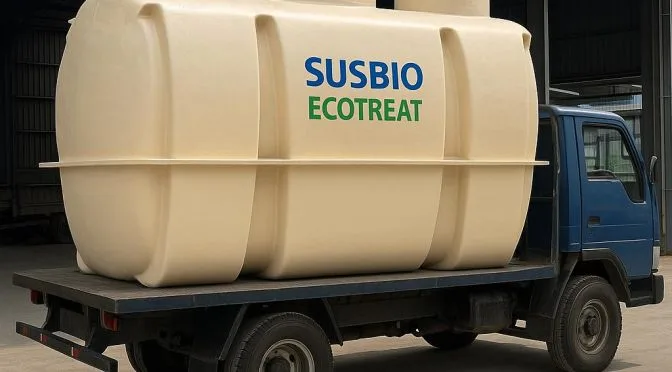
Frequently Asked Questions (FAQs)
1. What is domestic wastewater?
Domestic wastewater, also known as sewage, includes all wastewater generated from household activities such as using toilets (blackwater), showers, sinks, washing machines, and dishwashers (greywater). It may also include stormwater runoff from roofs and paved areas.
2. Why is domestic wastewater treatment important?
Treating domestic wastewater is essential to prevent contamination of groundwater and surface water, reduce the spread of diseases, protect ecosystems, and ensure sustainable use of water resources. Untreated sewage can pose serious health and environmental hazards.
3. What are the different methods of domestic wastewater treatment?
Common treatment methods include:
-
Conventional Septic Systems
-
Advanced Treatment Systems like aerobic units, media filters, and membrane bioreactors
Packaged Treatment Plants such as SUSBIO ECOTREAT for efficient, space-saving solutions
4. Which wastewater treatment system is best for homes with limited space?
Packaged treatment plants like SUSBIO ECOTREAT are ideal for compact residential spaces. They offer complete biological treatment in a small footprint and are suitable for urban or hilly areas with limited land availability.
5. How much wastewater does a typical household generate?
On average, a person generates 100–150 liters of wastewater per day. A family of four could produce up to 600 liters daily, depending on usage patterns.
6. Can treated domestic wastewater be reused?
Yes. Treated wastewater can be safely reused for irrigation, toilet flushing, gardening, and industrial processes, depending on the level of treatment and local regulations.
7. What is the difference between blackwater and greywater?
-
Blackwater: Contains human waste from toilets and requires full treatment
-
Greywater: Comes from sinks, showers, and appliances—less contaminated and can be reused after light treatment
8. How do I choose the right wastewater treatment system for my home?
Consider factors like soil type, available space, water table level, local regulations, household size, and budget. A professional site assessment is recommended.
9. Are wastewater treatment systems high-maintenance?
Basic septic systems require periodic desludging, while advanced systems like SUSBIO ECOTREAT need routine inspections and occasional servicing. Most modern systems are designed for low maintenance with automated operation.
10. Is it mandatory to install a domestic sewage treatment plant in India?
Yes, in many urban and peri-urban areas in India, local municipal bodies require STPs for residential layouts, especially in plotted developments or where centralized sewage systems are not available.
Conclusion: Choosing the Right Path for Cleaner Water at Home
Domestic wastewater treatment is no longer a luxury—it’s a necessity for safeguarding health, preserving water resources, and protecting the environment. Whether you live in a rural farmhouse or a compact urban home, choosing the right system for your property is crucial.
Traditional septic systems may work well for spacious rural plots, but advanced treatment systems and packaged solutions like SUSBIO ECOTREAT offer efficient, space-saving, and environmentally responsible alternatives for modern homes.
With increasing water scarcity, stricter environmental norms, and greater awareness of sustainable living, investing in the right wastewater treatment system delivers both immediate and long-term benefits. From regulatory compliance to water reuse opportunities, well-treated wastewater turns a liability into a valuable resource.
🔍 Evaluate your site conditions, household needs, and environmental goals—then make an informed decision. Partnering with trusted solutions like SUSBIO ECOTREAT ensures that your home stays future-ready, water-smart, and eco-responsible.



